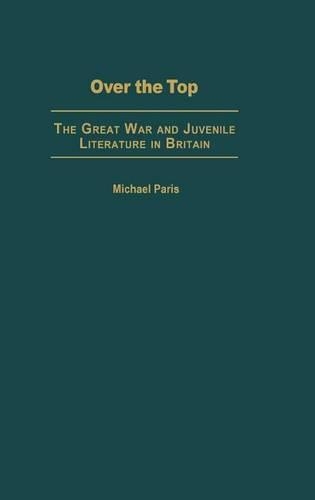
Over the Top: The Great War and Juvenile Literature in Britain
(Hardback)
Publishing Details
Over the Top: The Great War and Juvenile Literature in Britain
By (Author) Michael Paris
Bloomsbury Publishing PLC
Praeger Publishers Inc
30th October 2004
United States
Classifications
General
Non Fiction
Literary studies: c 1900 to c 2000
General and world history
First World War
823.912099282
Physical Properties
Hardback
216
Description
During the Great War, books and stories for young men were frequently used as unofficial propaganda for recruitment and to sell the war to British youth as a moral crusade. Until now, this literature has been neglected by academics, but the image of the war these fictions created was remarkably enduring and, despite the appearance of post-war literature of disillusioned veterans, continued to shape the attitudes of the young well into the 1930s. This is the first detailed account of how adventure fiction represented the Great War for British boys between 1914 and the end of the war. The author examines how such literature explained the causes of the war to boys and girls and how it encouraged young men to participate in the 'noble crusade' on the Western Front and in other theatres. He explores the imagery of the trenches, the war in the air, and the nature of war in the Middle East and Africa. He also details the links between popular writers and the official literary propaganda campaign. The study concludes by looking at how these heroic images remained in print, enduring well into the inter-war years.
Reviews
[A] readable study of British children's books as an ideological tool of government. As such it will serve students of history and popular culture as well as those pursuing study of juvenile literature. Recommended. Lower-/upper-division undergraduates; graduate students.-Choice
[M]akes a convincing case for continuity in the way that authors of juvenile fiction, some of them war veterans themselves by 1918, presented the Great War to British adolescents, rather than any great cultural shift or move towards "disillusionment." As the nature of the real war changed, a few working-class heroes appeared in their writings, or even a few heroines as nurses and spies, and their depictions of conflict became more violent. But the basic themes of a good war fought by young heroes for a just cause did not change. Further, these books continued to sell well and to be presented as school prizes up to the outbreak of the Second World War and even beyond. As the author concludes, British conventions for presenting fictionalised, warfare to the young were tested by the Great War, together with the existing stereotype of idealised masculinity, but the war experience modified them slightly rather than destroying them outright.-The Journal of Military History
"A readable study of British children's books as an ideological tool of government. As such it will serve students of history and popular culture as well as those pursuing study of juvenile literature. Recommended. Lower-/upper-division undergraduates; graduate students."-Choice
"Makes a convincing case for continuity in the way that authors of juvenile fiction, some of them war veterans themselves by 1918, presented the Great War to British adolescents, rather than any great cultural shift or move towards "disillusionment." As the nature of the real war changed, a few working-class heroes appeared in their writings, or even a few heroines as nurses and spies, and their depictions of conflict became more violent. But the basic themes of a good war fought by young heroes for a just cause did not change. Further, these books continued to sell well and to be presented as school prizes up to the outbreak of the Second World War and even beyond. As the author concludes, British conventions for presenting fictionalised, warfare to the young were tested by the Great War, together with the existing stereotype of idealised masculinity, but the war experience modified them slightly rather than destroying them outright."-The Journal of Military History
"[A] readable study of British children's books as an ideological tool of government. As such it will serve students of history and popular culture as well as those pursuing study of juvenile literature. Recommended. Lower-/upper-division undergraduates; graduate students."-Choice
"[M]akes a convincing case for continuity in the way that authors of juvenile fiction, some of them war veterans themselves by 1918, presented the Great War to British adolescents, rather than any great cultural shift or move towards "disillusionment." As the nature of the real war changed, a few working-class heroes appeared in their writings, or even a few heroines as nurses and spies, and their depictions of conflict became more violent. But the basic themes of a good war fought by young heroes for a just cause did not change. Further, these books continued to sell well and to be presented as school prizes up to the outbreak of the Second World War and even beyond. As the author concludes, British conventions for presenting fictionalised, warfare to the young were tested by the Great War, together with the existing stereotype of idealised masculinity, but the war experience modified them slightly rather than destroying them outright."-The Journal of Military History
Author Bio
MICHAEL PARIS is Professor of Modern History at the University of Central Lancashire and a Fellow of the Royal Historical Society. He specializes in the area of war and popular culture. His most recent book is Warrior Nation: Images of War in British Popular Culture, 1850-2000.
